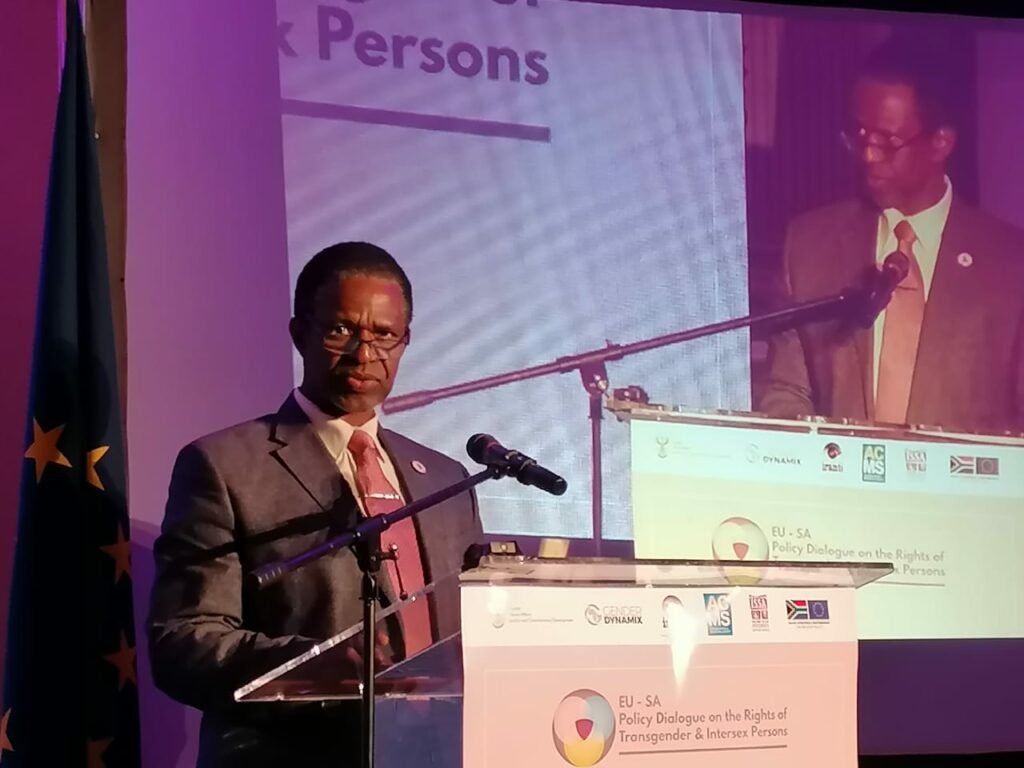By Tamsin Wort
Medical professionals should be trained in human rights, says United Nations Special Rapporteur on the Right to Health Dr Tlaleng Mofokeng.
Mofokeng delivered the keynote address on day two of the SA-EU Dialogue on Policy Improvements for Transgender and Intersex Persons on Friday 5 November 2021.
The SA-EU Dialogue kicked off in Pretoria on Thursday 4 November with a call for real change to enable Transgender and Intersex persons to exercise their rights.
Iranti, alongside civil society organisations Intersex SA, Gender Dynamix and the African Centre for Migration and Society, joined with representatives of the European Union and various South African government departments to review policy protections for Transgender and Intersex persons.
“This work holds great significance for the proceedings here today. The right to health must be realised and the mandate on the right to health is important for this discussion today,” Mofokeng said.
Mofokeng said an important aspect in discussions during the two-day conference was that the LGBTQIA+ community has been affected on a community, national and international level.
“Autonomy remains key and central to the work we’re able to achieve,” she said.
INTERSEX MEDICAL INTERVENTIONS
Mofokeng told participants Intersex anatomy doesn’t always show up at birth.
“Sometimes someone isn’t even aware until they’re much older or have difficulties with fertility when trying to conceive” adding that, “there is no affirming healthcare, especially on a primary level, for Intersex persons in South Africa.”
“We have to remove obstacles that prevent healthcare and medical professionals should be trained in human rights.”
Dr T, as she’s more popularly known, added that it’s very important to also talk about the fact that the right to health is interrelated to other human rights, like the right to life, equality, dignity, privacy, and access to information.
“People have to be protected. A lot of this work is about advocating for the self, first. How do we give information and in a way that informs consent for any intervention given the five-minute constraint as a public health medical professional?”
Mofokeng, quoting a definition by the World Health Organisation, said: “Transgender and Intersex people too require an affirmative and positive, and respectful approach to their health” adding that, “this is also important for them to have fulfilling sexual experiences.”
She said as a community, South Africa needed to adopt an orientation that seeks to address structural and indirect discrimination.
“When we talk about rights and what we want, we have to be clear about the power dynamics that are at play and give the power back to the individual.”
THE RIGHT TO HUMAN DIGNITY
Deputy Health Minister Dr Sibongiseni Dhlomo says Intersex people are often subjected to human rights violations and want rights to equality, human dignity and non-discrimination.

“We recognise that gender reaffirming surgery is a complex and multifaceted process that includes other elements like cosmetic surgery, breast augmentation etc,” Dhlomo said.
“We have developed a toolkit along with partners that we’ve rolled out to health workers to ensure that all healthcare facility staff are educated on transgender and Intersex persons.”
Dhlomo suggested that the underlying causes of discrimination stem from harmful stereotypes, adding that these stereotypes must be addressed and community members need to buy in to protect the rights of Intersex and transgender people.
“They’re forced into sterilisation, taking hormone replacement and other forms of medical violence.”
